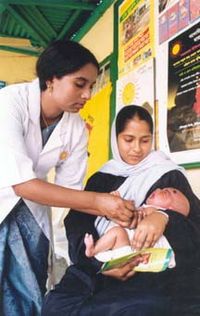
Photo from wikipedia
Severe mental illness (SMI) may interfere with parental caregiving practices and offspring development. Adhering to preventive well-child visits and maintaining good oral hygiene during early childhood requires parental involvement. Whether… Click to show full abstract
Severe mental illness (SMI) may interfere with parental caregiving practices and offspring development. Adhering to preventive well-child visits and maintaining good oral hygiene during early childhood requires parental involvement. Whether these activities are affected by parental SMI is unclear. The purpose of the present study was to determine whether children exposed to parental SMI are at increased risk of non-attendance to preventive well-child visits and vaccinations at age 0–5 years and of child dental caries experience at age 5 years. Furthermore, interactions between maternal psychiatric and sociodemographic variables in relation to an adverse child outcome were assessed. Data were obtained from national Danish health registers. All children born in Denmark between January 1997 and December 2010 were followed from birth until their 6th birthday. 679,339 children were included in the study (51% male). Of these, 49,059 children (7.8%) had at least one parent with a lifetime SMI diagnosis. Children of parents with SMI had elevated odds of missing well-child visits and vaccinations (OR 1.41; 95% CI 1.39–1.44, p < 0.0001), and of child dental caries (OR 1.58; 95% CI 1.55–1.62, p < 0.0001). In the presence of maternal SMI, low socioeconomic classification and single-mother status added more to the elevated risk than specific maternal diagnosis or timing of last psychiatric contact. Parents with SMI are less compliant with preventive child healthcare activities than parents without SMI. This indicates a need for practical support to these families in order to prevent inequality in health among their offspring.
Journal Title: Social Psychiatry and Psychiatric Epidemiology
Year Published: 2020
Link to full text (if available)
Share on Social Media: Sign Up to like & get
recommendations!